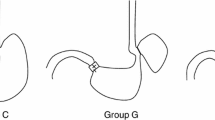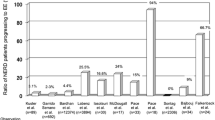Abstract
Background
Clinical role of low-dose aspirin (LDA) in pathogenesis of gastroesophageal reflux disease is by far controversial. This can be attributed to the paucity of basic research detailing the mechanism of LDA-induced esophageal mucosal injury (EI) on underlying chronic acid reflux esophagitis (RE).
Aim
The aim of this study was to clarify the effect of LDA on chronic RE in rats.
Methods
Esophagitis was induced in 8-week-old male Wistar rats by ligating the border between forestomach and glandular portion with a 2–0 silk tie and covering the duodenum with a small piece of 18-Fr Nélaton catheter. Seventy-eight chronic RE rat models were divided into five treatment groups, consisting of orally administered vehicle (controls), and aspirin doses of 2, 5, 50 or 100 mg/kg once daily for 28 days. EI was assessed by gross area of macroscopic mucosal injury, severity grade of esophagitis and microscopic depth of infiltration by inflammatory cells.
Results
Area of esophagitis in animals with aspirin dose of 100 mg/kg/day showed a 36.5% increase compared with controls, although it failed to achieve statistical significance (p = 0.812). Additionally, the rate of severe EI was increased in animals with aspirin dose of 100 mg/kg/day as compared with controls (p < 0.05). The grade of severity correlated with the depth of inflammation (r s = 0.492, p < 0.001).
Conclusions
Maximal dose aspirin (100 mg/kg/day) contributed in exacerbating preexisting EI. LDA (2 and 5 mg/kg/day), on the other hand, did not affect chronic RE in this model. LDA seems to be safe for use in patients with chronic RE.





Similar content being viewed by others
References
Vakil N, van Zanten SV, Kahrilas P, Dent J, Jones R. The Montreal definition and classification of gastroesophageal reflux disease: a global evidence-based consensus. Am J Gastroenterol. 2006;101:1900–1920.
Fujiwara Y, Arakawa T. Epidemiology and clinical characteristics of GERD in Japanese population. J Gastroenterol. 2009;44:518–534.
Baigent C, Blackwell L, Collins R, et al. Aspirin in the primary and secondary prevention of vascular disease: collaborative meta-analysis of individual participant data from randomised trials. Lancet. 2009;373:1849–1860.
Leung WK, Bjarnason I, Wong VW, Sung JJ, Chan FK. Small bowel enteropathy associated with chronic low-dose aspirin therapy. Lancet. 2007;369:614.
Endo H, Hosono K, Inamori M, et al. Characteristics of small bowel injury in symptomatic chronic low-dose aspirin users: the experience of two medical centers in capsule endoscopy. J Gastroenterol. 2009;44:544–549.
Shimada Y, Nagahara A, Hojo M, et al. Upper gastrointestinal mucosal injury and symptoms in elderly low-dose aspirin users. Gastroenterol Res Pract. 2015. https://doi.org/10.1155/2015/252963.
Taha AS, Angerson WJ, Morran CG. Correlation between erosive oesophagitis and gastro-duodenal disease: the influence of aspirin, simple analgesics, and Helicobacter pylori. Eur J Gastroenterol Hepatol. 2002;14:1313–1317.
Yeomans N, Lanas A, Labenz J, et al. Efficacy of esomeprazole (20 mg once daily) for reducing the risk of gastroduodenal ulcers associated with continuous use of low-dose aspirin. Am J Gastroenterol. 2008;103:2465–2473.
Yamamoto T, Mishina Y, Ebato T, et al. Prevalence of erosive esophagitis among Japanese patients taking low-dose aspirin. J Gastroenterol Hepatol. 2010;25:792–794.
Omura N, Kashiwagi H, Chen G, Suzuki Y, Yano F, Aoki T. Establishment of surgically induced chronic acid reflux esophagitis in rats. Scand J Gastroenterol. 1999;34:948–953.
Miwa H, Koseki J, Oshima T, et al. Rikkunshito, a traditional Japanese medicine, may relieve abdominal symptoms in rats with experimental esophagitis by improving the barrier function of epithelial cells in esophageal mucosa. J Gastroenterol. 2010;45:478–487.
Nahata M, Saegusa Y, Harada Y, Tsuchiya N, Hattori T, Takeda H. Changes in ghrelin-related factors in gastroesophageal reflux disease in rats. Gastroenterol Res Pract. 2013. https://doi.org/10.1155/2013/504816.
Masaka T, Iijima K, Endo H, et al. Gender differences in oesophageal mucosal injury in a reflux oesophagitis model of rats. Gut. 2013;62:6–14.
Abdel-Aziz H, Schneider M, Neuhuber W, et al. GPR84 and TREM-1 signaling contribute to the pathogenesis of reflux esophagitis. Mol Med. 2015;21:1011–1024.
Lee J, Anggiansah A, Anggiansah R, Young A, Wong T, Fox M. Effects of age on the gastroesophageal junction, esophageal motility, and reflux disease. Clin Gastroenterol Hepatol. 2007;5:1392–1398.
Fox M, Barr C, Nolan S, Lomer M, Anggiansah A, Wong T. The effects of dietary fat and calorie density on esophageal acid exposure and reflux symptoms. Clin Gastroenterol Hepatol. 2007;5:439–444.
Hampel H, Abraham NS, El-Serag HB. Meta-analysis: obesity and the risk for gastroesophageal reflux disease and its complications. Ann Intern Med. 2005;143:199–211.
Xie T, Cui X, Zheng H, Chen D, He L, Jiang B. Meta-analysis: eradication of Helicobacter pylori infection is associated with the development of endoscopic gastroesophageal reflux disease. Eur J Gastroenterol Hepatol. 2013;25:1195–1205.
Taha AS, McCloskey C, Prasad R, Bezlyak V. Famotidine for the prevention of peptic ulcers and oesophagitis in patients taking low-dose aspirin (FAMOUS): a phase III, randomised, double-blind, placebo-controlled trial. Lancet. 2009;374:119–125.
Masuda T, Mittal SK. Current animal models of gastroesophageal reflux disease, Barrett’s esophagus, and esophageal adenocarcinoma. J Nat Sci. 2017;3:e387.
Lanas AI, Sousa FL, Ortego J, et al. Aspirin renders the oesophageal mucosa more permeable to acid and pepsin. Eur J Gastroenterol Hepatol. 1995;7:1065–1072.
Pawlik M, Pajdo R, Kwiecien S, et al. Nitric oxide (NO)-releasing aspirin exhibits a potent esophagoprotection in experimental model of acute reflux esophagitis. Role of nitric oxide and proinflammatory cytokines. J Physiol Pharmacol. 2011;62:75–86.
Konturek SJ, Konturek PC, Brzozowski T. Prostaglandins and ulcer healing. J Physiol Pharmacol. 2005;56:5–31.
Sostres C, Gargallo CJ. Gastrointestinal lesions and complications of low-dose aspirin in the gastrointestinal tract. Best Pract Res Clin Gastroenterol. 2012;26:141–151.
Wallace JL. Prostaglandins, NSAIDs, and gastric mucosal protection: why doesn’t the stomach digest itself? Physiol Rev. 2008;88:1547–1565.
Cryer B, Feldman M. Effects of very low dose daily, long-term aspirin therapy on gastric, duodenal, and rectal prostaglandin levels and on mucosal injury in healthy humans. Gastroenterology. 1999;117:17–25.
Lanas A, Jiménez P, Ferrández A, et al. Selective COX-2 inhibition is associated with decreased mucosal damage induced by acid and pepsin in rabbit esophagitis. Inflammation. 2003;27:21–29.
Fujiwara Y, Higuchi K, Hamaguchi M, et al. Increased expression of transforming growth factor-alpha and epidermal growth factor receptors in rat chronic reflux esophagitis. J Gastroenterol Hepatol. 2004;19:521–527.
Edebo A, Vieth M, Tam W, et al. Circumferential and axial distribution of esophageal mucosal damage in reflux disease. Dis Esophagus. 2007;20:232–238.
Nishino M, Sugimoto M, Kodaira C, et al. Relationship between low-dose aspirin-induced gastric mucosal injury and intragastric pH in healthy volunteers. Dig Dis Sci. 2010;55:1627–1636. https://doi.org/10.1007/s10620-009-0920-3.
Nishino M, Sugimoto M, Kodaira C, et al. Preventive effects of lansoprazole and famotidine on gastric mucosal injury induced by low-dose aspirin in Helicobacter pylori-negative healthy volunteers. J Clin Pharmacol. 2011;51:1079–1086.
Uotani T, Sugimoto M, Nishino M, et al. Ability of rabeprazole to prevent gastric mucosal damage from clopidogrel and low doses of aspirin depends on CYP2C19 genotype. Clin Gastroenterol Hepatol. 2012;10:879.e2–885.e2.
Acknowledgments
This study was technically supported in part by Department of Pathology, the Jikei University School of Medicine.
Author information
Authors and Affiliations
Corresponding author
Ethics declarations
Conflict of interest
All authors have read the journal publication policy and have no relevant financial disclosures and conflicts of interest with regards to this paper.
Rights and permissions
About this article
Cite this article
Masuda, T., Yano, F., Omura, N. et al. Effect of Low-Dose Aspirin on Chronic Acid Reflux Esophagitis in Rats. Dig Dis Sci 63, 72–80 (2018). https://doi.org/10.1007/s10620-017-4840-3
Received:
Accepted:
Published:
Issue Date:
DOI: https://doi.org/10.1007/s10620-017-4840-3




